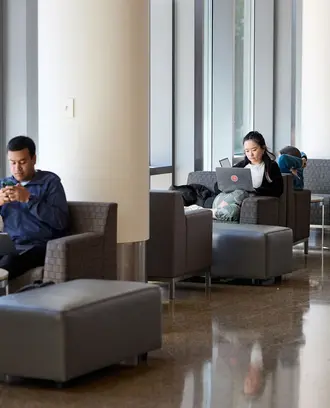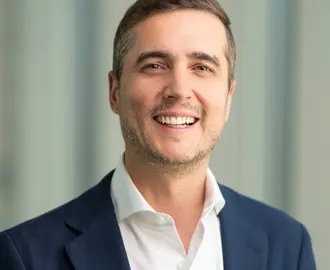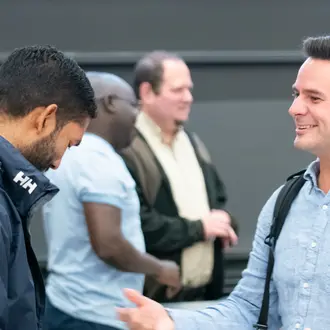A shifting perspective: How one SFMBA is working to inform data decisions in the U.S. Coast Guard
CAPT Brian Erickson, SFMBA ‘21, was recently named the United States Coast Guard’s first Chief Data Officer (CDO). Erickson takes this assignment following his time with the MIT Sloan Fellows MBA.
The Coast Guard has embarked on a journey to leverage the full potential of data as a strategic asset. In August 2020, the Vice Commandant of the Coast Guard formally chartered the Data Readiness Task Force that is now led by the Chief Data Officer. The task force is focused on lines of effort that include workforce development, data governance, data analytics and platform operations.
Brian was recently named a member of the 2022 DataIQ US top 100 most influential people in data and took some time to talk with us about his new role.
How did your MIT SFMBA journey help prepare you for your assignment as the Chief Data Officer (CDO)?
Brian Erickson, SFMBA '21
I was extremely challenged during the MIT Sloan Fellows MBA and learned to look at problems through different lenses. The ability to shift my own perspective when looking at a problem has been useful as I stepped into this most recent assignment as the Chief Data Officer. This organization has been around since 1790 and we really haven’t fully committed to looking at ourselves through a data-driven lens. This has caused siloed data sources, outdated processes and a fragmented data culture.
Our team is the first dedicated group that gets the opportunity to explore specific challenges through data. For example, we often know who owns a particular IT system, but when asking the question of “who owns the data?” we sometimes find multiple answers.
Our team has already published a strategy and developed a strong foundation of data governance that will set standards, priorities, and decide on a common lexicon. We’re developing a federated ownership and stewardship structure that will empower data owners and stewards to care for their data like we care for other tangible assets such as ships, aircraft and buildings.
What are the challenges that you are facing as the first United States Coast Guard CDO?
The organization does a pretty good job at collecting data, but we tend to store it in siloed systems that don’t have common standards and often fail to talk to each other. This sounds like a technological problem, but that is only part of the equation.
Legacy technology shortcomings are among the easiest problems to fix and data is much more than just technology. Modern data teams understand that the most important steps to take towards achieving competitive advantage on the data frontier will be taken along a pathway that influences people and culture. We need a skilled workforce equipped with experts in architecture, analytics, management, security, and privacy. We will need a robust, federated data ownership and data stewardship structure that doesn’t currently exist. Finally, we will need a culture that accepts and embraces data disruption for the advancement of business outcomes. Some of the biggest challenges we are facing right now will come from taking big steps with people, processes, and culture.
Which framework or course lesson from the MIT Sloan Fellows MBA will most help you in your role as CDO?
Without question, I took nuggets of value from every class in the program, each being applicable to my new role. I found the real-world application of The Law of Big Data, AI and Robotics with John Akula a fascinating course. For me, it was delivered as a personal introduction into understanding the ethical landscape surrounding big data and AI with some amazing anecdotal cases that cemented the technical concepts to the course curriculum.
Another course that offered an opportunity to perform some data analytics, but also explore one area of the digital ecosystem, was Digital Marketing and Social Media Analytics with Sinan Aral. My background was not in data analytics so this course provided insights on the power of modern analytical tools and how data can be manipulated in the marketing, social media, and crowdsourcing space. Individuals within the Coast Guard have used crowdsourcing analytics during urban search and rescue efforts responding to major catastrophes like coastal hurricanes.
Other courses that translated easily to my new role include Communication and Persuasion Through Data and Platform Strategy.
How did stepping away from your career for the one-year MIT Sloan Fellows MBA program recalibrate your career goals?
Within our military rank structure, this opportunity came at the right time. I was moving from Commander to Captain, and I needed to rise to a strategic level of thinking that wasn’t necessary in any of my previous assignments. I’m still working to find the balance in my current assignment where I devote the right amount of time to tactical execution versus strategic planning. At MIT, the exposure to other mid-level executives helped me find that balance.
Despite stepping away at the best time for me, based on military rank structure, I was slightly early when looking at my job assignment. I wish I had been the Chief Data Officer for two to three years and then had the opportunity to attend the MIT Sloan Fellows MBA. I would have harnessed a much larger chunk of the MIT ecosystem and focused my network in the data space.
The MIT Sloan Fellows MBA brings together mid-career leaders from over 30 different countries. How did working—and collaborating—with this diverse cohort help to prepare you for what’s next in your role as CDO?
For me, I think it comes down to friendship, perspective, and the network. I was exposed to 110 new friends with exciting life stories and people who bring so much talent to this program. MIT hand-selected these leaders for this one-year immersive experience. All have amazing stories and have made substantial contributions across the spectrum from service to nation, to global impact.
Second, because my cohort came from 37 countries, they have significantly different perspectives regarding life’s challenges and rewards. During our year, we were in the pinnacle of the COVID-19 pandemic, so I felt like my close interaction with this diverse peer group offered greater global exposure to COVID-related reactions from industry to government to healthcare. This global knowledge armed me with a perspective that was immediately valuable following the program.
One of my first assignments was to become the Information System Owner of the analytical platform for the entire US Coast Guard COVID-19 Common Operational Picture. I was responsible for business outcomes, platform development, operation, and improvements. The platform was developed to manage vaccine distribution and vaccination tracking for the entire active duty and reserve workforce. Our combined efforts led to winning the 2021 Department of Homeland Security Innovation Award.
Finally, the network is solid gold. Because of the diversity in country origin, community of practice, and history of employment positions, my cohort of peers (and the amazing faculty at MIT) can either answer any business question I have, or refer me to someone they know who wrote the book on the topic. Our WhatsApp group is labeled “CONFIRMED SFMBA 21’ NFLB”—a fitting commitment to each member of the cohort to ensure that there is No Fellow Left Behind (NFLB) and we remain ready to support each other in any way that we can.



